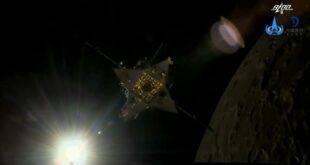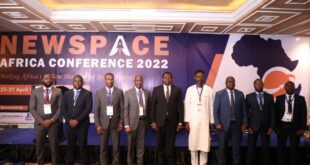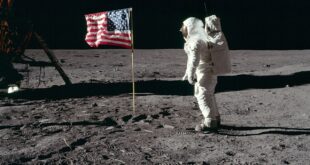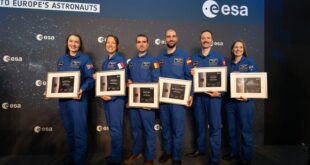 As part of the partnership between SpaceWatch.Global and the European Space Policy Institute, we have been granted permission to publish selected articles and briefs. This is ESPI Briefs No. 34: ‘Toward a more strategic, assertive and united Europe in Space’, originally published in September 2019.
As part of the partnership between SpaceWatch.Global and the European Space Policy Institute, we have been granted permission to publish selected articles and briefs. This is ESPI Briefs No. 34: ‘Toward a more strategic, assertive and united Europe in Space’, originally published in September 2019.
1. Europe faces international challenges
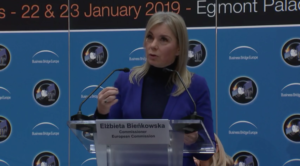
In her opening speech at the 11th Annual Conference on European Space Policy in January 2019, Commissioner Bieńkowska gave a forthright perspective on the state of European affairs in space underlining that “the space sector is undergoing massive changes worldwide. A new reality emerges and the European space sector and policies must adapt and react to it. […] It is the position of Europe in space that is at stake.” Ms. Bieńkowska’s assessment of a European space sector increasingly challenged by a fast changing international landscape echoed loudly during the 13th ESPI Autumn Conference (18-19 September 2019 – Vienna) which brought together high-level officials to discuss the European space strategy in a global context and to debate challenges and opportunities ahead of Europe in the field of space diplomacy.
During the annual two-day conference of the Institute, keynote speakers and panelists shared quite consensually the conviction that the space ecosystem is quickly mutating and that many challenges ahead of the European space sector have a strong, sometimes dominant, international dimension. Overall, it is the place of Europe as a competitor on commercial markets, as a partner in international endeavours and even as an actor in outer space that is at stake.
Representatives of the industry, manufacturers, operators and launch service providers alike, shared serious concerns about current and expected developments of the state of affairs. Europe leveraged extensively (and so far, quite successfully) commercial markets to support the development of its industrial base but now finds itself squeezed between an intensifying competition and new business forces affecting core markets. In this context, the active involvement of governments in trade and/or regulatory affairs play an ever more prominent role in the commercial performance of their domestic industry. Much more significantly exposed to commercial “open” satellite and launch service markets than its competitors, the fluctuations and difficulties faced by the European industry today, and which could further deteriorate in the future, resonate in the European space sector at large, shaking the long-established foundations of the so-called “European way”.
In parallel, the expansion and acceleration of global space activities also create new challenges to the safety and sustainability of space systems while the more assertive stance of some foreign governments in the field of space defence and security is bringing forward new geopolitical and military stakes. European governments have long expressed their concerns about the peaceful, responsible and fair sharing of outer space but the recent acceleration of policy developments in these domains, in particular in the United States, is pressing Europe to step up its effort around a more determined and comprehensive approach to weigh in upcoming international frameworks and ensure a balanced cooperation with other actors.
In this challenging international context, officials of the diplomatic service, André Rypl, Chair of the UN COPUOS and François Rivasseau, Permanent Representative of France to the United Nations in Geneva, reminded recent developments in multilateral negotiations and recalled the possibilities but also limits and conditions of the diplomatic action. More specifically, current European preoccupations converge well with the four pillars identified by ESA in the preparation of the next Ministerial Council (Science & Exploration, Applications, Safety & Security, Enabling & Supporting) which encompass, all, a strong international dimension. Ultimately, and in line with Ms. Bieńkowska’s assessment, it is the capacity of Europe to pursue its success story and to “promote its position as a leader in space, increase its share on the world space markets, and seize the benefits and opportunities offered by space” that is at stake today.
2. Toward a more strategic, assertive and united Europe in space
In her mission letter to Josep Borrell, High Representative of the Union for Foreign Affairs and Security Policy, the incoming President-elect of the European Commission, Ursula von der Leyen, called for a Geopolitical Commission able to make the European Union more strategic, more assertive and more united in its approach to external relations. On this path, and with the objective to strengthen European leadership, Ms. von der Leyen underlined the need to take decisions in a faster and more efficient way, to better link the internal and external aspects of European policies, to make the external action a systematic part of the decision-making process, to take bold steps towards a genuine European Defence Union and to ensure a strategic use of external financial instruments to contribute to wider political aims and enhance Europe’s leadership and influence in the world. In many ways, challenges ahead of Mr. Borrell resonate particularly strongly in the space sector. Progressing toward a more strategic, assertive and united Europe also in space is now essential to protect European interests and promote European positions on the international scene, be it on commercial markets or bilateral and multilateral frameworks. The situation is rapidly deteriorating and stakes are high to maintain a level playing field and fair competition, to ensure a safe and sustainable sharing of outer space and to preserve Europe’s place as a key actor and partner in space.
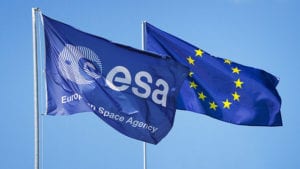
The “European way” can also be seen as a “European paradox”: while Europe is, by far, the most exposed to the fluctuations of commercial markets and reliant on third-party technologies and solutions, it is also the least well equipped to safeguard its interests in international affairs. Yet, while the growing role of the private sector in space is often praised as a promising lever, it would be a mistake to conclude that a logical corollary to this trend is a decline of the role of public actors. The current change of paradigm is not calling for a progressive withdrawal of governments from space affairs but for a change in the way space activities are supported. After all, recent and expected developments on the global scene, as well as resulting geopolitical, programmatic and commercial challenges for Europe, are the direct or indirect result of a determined will-to-power of major space-faring states which gave rise to ambitious policies in the space sector. Today, the request of the European space sector is that governments implement all necessary measures to protect the industrial, commercial and strategic interests of Europe, in the same way other space powers do.
From this standpoint, and along the lines drawn by Mr. Borrell’s mission letter, it seems now essential to make external actions an integral part of the European space strategy and to embed space affairs in the broader international agenda of Europe. Profoundly global and at the crossroad of many policy challenges of the European Union (security and defence, digital agenda, internal market, industrial policy, socio-economic development…), space may actually be an ideal test case to shape such strategic, assertive and united approach to geopolitics. Such action can, however, only be effective if it follows clear and shared European positions and objectives in the space sector. The audience of the 13th ESPI Autumn Conference welcomed very much the announcement of new, essential, diplomatic initiatives to establish (and promote) key principles for safety, security and sustainability of outer space as well as for global space economy. These initiatives will be stepping stones in what should be conceived as a coherent ensemble of policies and diplomatic actions serving the interests of the European space sector, in line with a clear and shared political vision (that is still missing) for Europe in space and space in Europe.
Rights reserved – this publication is reproduced with permission from ESPI. “Source: ESPI “ESPI Briefs” No. 34, September 2019. All rights reserved”
For more articles please visit ESPI website (www.espi.or.at).


